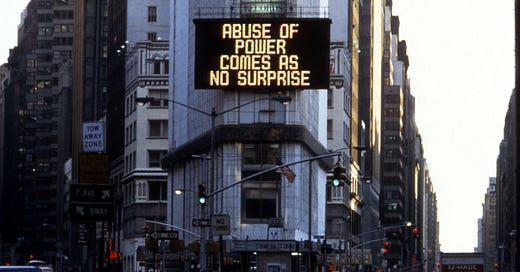My Mistake: On Sexual Harassment at Creative Nonfiction
In solidarity with the former workers of Creative Nonfiction.
This week a friend sent me a Twitter thread I most likely wouldn’t have seen unless they sent it to me because I am rarely on Twitter. The thread discussed how and why the former employees of Creative Nonfiction left last month. This friend was also the friend who first encouraged me to write about my experience as a former fellow for CNF, a year that was marked by sexual harassment and an indiscreet lack of professionalism.
The sexual harassment went on for years after my year as a fellow at the magazine. I was a fellow from 2015 to 2016. I met my friend at a writing residency in 2018. They mentioned CNF to me and I withered a bit until I mentioned how negative of an experience I had working there and how grateful I was when it was over. They were appalled when I told them about it and said I needed to write about it. I wrote an essay that night.
Shortly after, they put me in touch with an editor they thought might be interested in publishing the essay as part of a series about rape culture. The editor was indeed interested and said she needed to talk to her team. Ultimately, they had to pass because they were concerned about any legal ramifications of publishing the essay. Essentially, if they were sued, the magazine would fold.
Since 2018, I have had more than a handful of editors express interest and remorse to me for the same reasons. This is just one of the many ways that those in positions of power are able to continue behaving badly without repercussions.
Discovering this news in the last week about the former workers of CNF has been complicated for me. A part of me wanted to believe that my experience was singularly bad. That my history of sexual abuse and assault has made me more susceptible and sensitive to the kind of behavior I experienced, though I knew that was unlikely true. This is why I have discouraged others over the last 7 years to not work for CNF, even though it has been a source of work for a lot of emerging and established writers, editors, and teachers.
My experience as a fellow was one of the most unprofessional, uncomfortable, and unsafe experiences I’ve had as a worker—despite being groped, called names, and told behind closed doors which men to avoid being alone with when traveling for work over the course of my career.
My experience with CNF was the first time I was publicly humiliated and sexualized in front of my peers and colleagues, multiple times. No one in a position of power said or did anything to stop it.
The silence and the history of this particular kind of silence was palpable. I shrank from the literary community for years after these experiences. I still feel disgusted when I think of this time and sorrow for the workers who have needed to depend on these opportunities and have been taken advantage of and often abused, which is particularly common with working-class and working-poor first-generation students like myself.
Though another magazine may not be able to take the risk of publishing this essay, I can now. I stand in solidarity with every other working-class and working-poor first-generation student or writer or editor or teacher who has too commonly been disrespected and disempowered in the workplace.
I also stand in solidarity with the former workers of Creative Nonfiction and those who are seeking and in need of work due to the poor leadership of this organization. If you can, please follow this thread and account to see who you can support and how.
Love,
Bowie (formerly Rachel) + Failure
My Mistake
Mistake #1
I took the job. I took the job that paid very little because I needed the money even though it was a small sum, and I was interested in the experience and the people I might meet, and what I might learn. When he hired me, he took great pains to remind me that the work would be difficult. He wasn't sure I could handle it, despite me being, admittedly, overqualified for the position, having five years of work experience in a related field already. I smiled. I listed the reasons I knew I was capable of handling the work.
I asked him, "Do you have any other concerns about me?"
I'd been taught to ask this at the end of interviews when I first applied for internships in college, but it wasn't a new lesson. I had learned before this to read any situation for cues of displeasure, especially if the displeased person was a man. I had learned to accommodate accordingly, to make a case for myself, to explain with a smile on my face, that I was capable and good.
Keep reading with a 7-day free trial
Subscribe to Ask a Failure to keep reading this post and get 7 days of free access to the full post archives.




